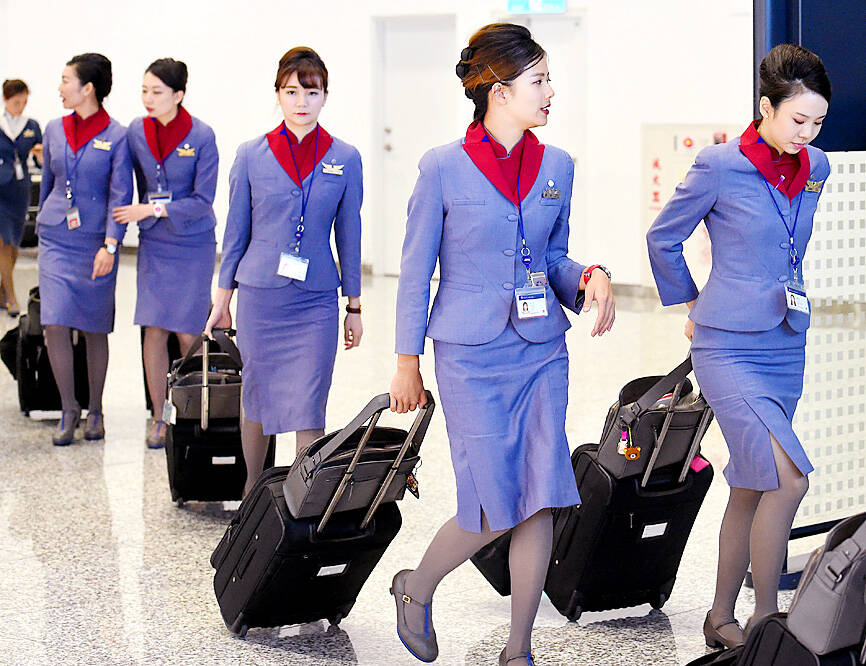The Civil Aviation Administration (CAA) yesterday pledged to hold a meeting with airline executives in three months on allowing gender-neutral uniforms for flight attendants after a legislative committee demanded the change and froze part of the agency’s budget.
The agency faced a barrage of questions about the issue from the legislature’s Transportation Committee, which was reviewing its budget for the next fiscal year.
Earlier this year, 13 EVA Airways Corp (長榮航空) flight attendants filed a labor complaint against the airline for restricting female flight attendants to wearing skirts, along with other gender-specific discriminatory practices. In August, they petitioned the National Human Rights Commission for a change in the dress code.

Photo: Chu Pei-hsiung, Taipei Times
However, the Taoyuan City Government’s gender equality committee in September ruled in favor of the airline.
Many international airlines have changed their policies to add trousers to the uniforms of female flight attendants, but most Taiwanese airlines still require female cabin crew to wear skirts and high-heeled shoes, Democratic Progressive Party (DPP) Legislator Chen Su-yeuh (陳素月) said.
The dress code is incongruous with the UN Convention on the Elimination of All Forms of Discrimination Against Women, she said, adding that the CAA should ensure that Taiwanese airlines adhere to the international treaty.
In 2013, South Korea’s National Human Rights Commission ruled that Asiana Airlines’ policy of requiring all female employees to wear skirts was a practice of gender discrimination, New Power Party Legislator Chiu Hsien-chih (邱顯智) said.
“While it is very common to see female flight attendants at European airlines wear pants, [most] Taiwanese airlines seem very backward as they continue to require women to wear skirts and makeup,” Chiu said. “Taiwan recognizes same-sex marriage and is generally viewed by international community as a country that values gender equality. We should be equally progressive in this respect.”
DPP Legislator Ho Hsin-chun (何欣純) said that wearing a tight skirt could make it difficult for female flight attendants to quickly respond in emergency situations.
The CAA should do more than simply ask airlines to provide a diverse choice of uniforms and demand a timeline on when they would make changes, Ho said.
Lawmakers passed a motion to freeze 10 percent of the budget allocated to “general administrative expenditure” — about NT$50 million (US$1.55 million) — until the CAA submits a written report on how airlines would adjust their corporate policies in accordance with the UN convention.
They also froze NT$500,000 in the Civil Aviation Operation Fund until the agency submits another report in two months on how dress codes would be listed as an item in the gender equality evaluation of airlines.
CAA Director-General Lin Kuo-hsien (林國顯) said that the agency would meet with airline executives in three months to discuss possible options.
“There is no regulation that requires flight attendants to wear skirts or trousers, and airlines design their uniforms based on their corporate policies and whether the uniforms facilitate the work of flight attendants aboard. So far, only female flight attendants of low-cost carrier Tigerair Taiwan wear trousers as uniforms,” Lin said.
“Airlines are not against the idea of allowing employees to vote for diverse uniform designs, but designing a new uniform takes time,” he said.

AGING: As of last month, people aged 65 or older accounted for 20.06 percent of the total population and the number of couples who got married fell by 18,685 from 2024 Taiwan has surpassed South Korea as the country least willing to have children, with an annual crude birthrate of 4.62 per 1,000 people, Ministry of the Interior data showed yesterday. The nation was previously ranked the second-lowest country in terms of total fertility rate, or the average number of children a woman has in her lifetime. However, South Korea’s fertility rate began to recover from 2023, with total fertility rate rising from 0.72 and estimated to reach 0.82 to 0.85 by last year, and the crude birthrate projected at 6.7 per 1,000 people. Japan’s crude birthrate was projected to fall below six,

Conflict with Taiwan could leave China with “massive economic disruption, catastrophic military losses, significant social unrest, and devastating sanctions,” a US think tank said in a report released on Monday. The German Marshall Fund released a report titled If China Attacks Taiwan: The Consequences for China of “Minor Conflict” and “Major War” Scenarios. The report details the “massive” economic, military, social and international costs to China in the event of a minor conflict or major war with Taiwan, estimating that the Chinese People’s Liberation Army (PLA) could sustain losses of more than half of its active-duty ground forces, including 100,000 troops. Understanding Chinese

US President Donald Trump in an interview with the New York Times published on Thursday said that “it’s up to” Chinese President Xi Jinping (習近平) what China does on Taiwan, but that he would be “very unhappy” with a change in the “status quo.” “He [Xi] considers it to be a part of China, and that’s up to him what he’s going to be doing, but I’ve expressed to him that I would be very unhappy if he did that, and I don’t think he’ll do that. I hope he doesn’t do that,” Trump said. Trump made the comments in the context

SELF-DEFENSE: Tokyo has accelerated its spending goal and its defense minister said the nation needs to discuss whether it should develop nuclear-powered submarines China is ramping up objections to what it sees as Japan’s desire to acquire nuclear weapons, despite Tokyo’s longstanding renunciation of such arms, deepening another fissure in the two neighbors’ increasingly tense ties. In what appears to be a concerted effort, China’s foreign and defense ministries issued statements on Thursday condemning alleged remilitarism efforts by Tokyo. The remarks came as two of the country’s top think tanks jointly issued a 29-page report framing actions by “right-wing forces” in Japan as posing a “serious threat” to world peace. While that report did not define “right-wing forces,” the Chinese Ministry of Foreign Affairs was